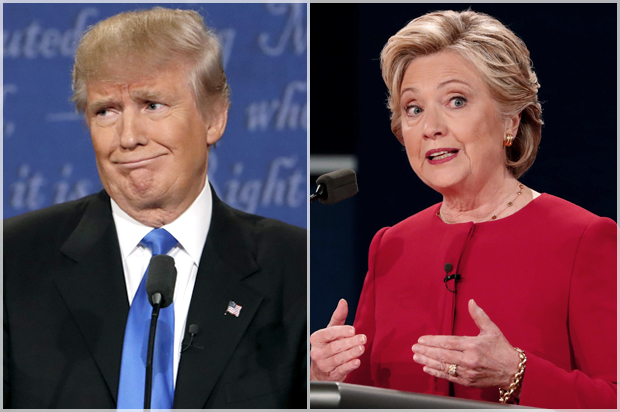On Monday night, Hillary Clinton became the first woman to ever appear on the general election debate stage as a candidate. It was the latest in her string of political firsts, which she added to later that same evening by becoming, in my broadly shared opinion, the first woman to win a presidential debate.
Her opponent, Republican presidential nominee Donald Trump, lost for a variety of reasons. He was barely in control of himself throughout the event, rising to every minor provocation and discrediting himself in the process. Early on in the debate, Democratic presidential nominee Clinton accurately described Trump as “one of the people who rooted for the housing crisis” because it presented a moneymaking opportunity for him.
Unable to restrain himself, Trump leaned into his microphone and snippily interjected, “That’s called business, by the way.” In a normal election cycle, a presidential candidate admitting on the debate stage that he was itching for a global economic collapse so he could turn a quick buck would probably be treated as politically fatal.
But that’s not what hurt Trump the most. What brought Trump low was racism — his own and his related inability to demonstrate even the shallowest understanding of how it hurts people.
Debate moderator Lester Holt asked both candidates how they would “heal the racial divide.” Clinton, whose past political life has been marred by racial politicking, gave a thoughtful answer on the root problem of systemic racism, the mistrust between police and minority communities, the availability of firearms, the need to train law enforcement officers to deal more effectively with people with mental health issues and the problems of implicit bias.
Asked by Holt if she believes that “police are implicitly biased against black people,” Clinton made the point that such biases are a problem for everyone not just for the police. But such bias is of special importance for cops because “it can have literally fatal consequences,” she said. She could (and should) have been pressed more on the legacy of former president Bill Clinton crime policies from the 1990s, but overall her comments on race and inequality in the justice system were some of her best remarks for the evening.
Trump, when asked how he would address racial division, said “law and order.” He invited viewers to “look at what’s going on in Charlotte.” But rather than talk about the city’s longstanding history of racial division or its recent protests and riots over the shooting death by police of a black man, he described it as “a city I love, a city where I have investments.”
Once again Trump called for expanded use of a stop-and-frisk policy, an ineffective policing technique that promotes alienation between cops and minority communities. He incorrectly challenged Holt’s observation that a stop-and-frisk policy had been thrown out in New York by a judge who found that it violated the constitutional rights of the city’s minority residents. At every point during the discussion about race Trump was wrong, self-focused or talking up the police.
But that was just the table-setter for the discussion of Trump’s history as the leader of the birther movement, which maintained that the first black president of the United States was lying about his country of birth and ineligible to hold office. Trump was cornered on this by both Clinton and Holt, and his worst qualities came oozing out.
Asked by Holt why he continued pressing the birther issue after President Barack Obama produced his birth certificate, Trump congratulated himself for being so persistent, as though he’d done the country a favor. “Nobody was caring much about it,” he said. “But I was the one that got him to produce the birth certificate. And I think I did a good job.”
When Holt asked him what he would say to people of color about his behavior, Trump cut him off. “I say nothing. I say nothing because I was able to get him to produce it,” he said. “He should have produced it a long time before. I say nothing.”
Clinton didn’t let him off the hook. She (correctly) described the “racist lie” of birtherism as the foundation of Trump’s political career and brought up the Justice Department’s lawsuits against Trump for racially discriminatory renting practices during the 1970s.
Trump again dug in, boasting, “I settled that lawsuit with no admission of guilt,” and then demanding recognition for the fact he doesn’t break the law by discriminating against anyone at his club in Palm Beach. “I opened a club, and really got great credit for it. No discrimination against African-Americans, against Muslims, against anybody. And it’s a tremendously successful club. And I’m so glad I did it. And I have been given great credit for what I did. And I’m very, very proud of it.”
Race has always been at the core of Trump’s campaign. On Monday night, a broad swath of Americans got to see that ugly reality. He lurched back and forth from not understanding how racism works to celebrating and reaffirming his central role in promulgating a racist conspiracy theory. Either one of those things should be disqualifying for a candidate for president of the United States. And it was especially jarring to see a major-party presidential nominee turn in such a disgraceful performance alongside a candidate who made history simply by being there.


